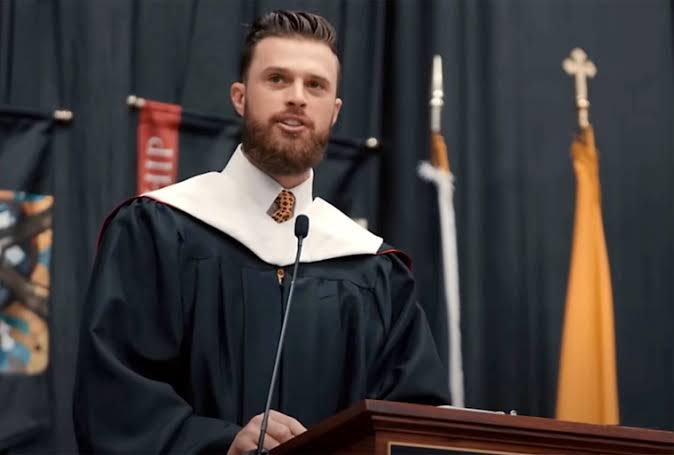In a surprising twist to the ongoing controversy involving Kansas City Chiefs kicker Harrison Butker, pop superstar Taylor Swift has reportedly given her boyfriend, Travis Kelce, an ultimatum: either Butker is removed from the team, or their relationship is over. This dramatic demand places Kelce in a precarious position, straddling the demands of his personal life and the dynamics of his professional team.
Harrison Butker became a figure of national debate following a series of public remarks that many criticized as divisive. His stance on various social issues, expressed during a recent public appearance, has not only affected his standing with the public but has also seemingly infiltrated the personal relationships of his teammates. As a prominent figure both on and off the field, Butker’s actions have had far-reaching consequences.
Taylor Swift, known for her influential voice in matters of social justice, reportedly took issue with Butker’s comments, which she found misaligned with her values. Sources close to Swift say she has been deeply troubled by the thought of her significant other sharing a professional space with someone whose views propagate negativity and divisiveness. Her ultimatum to Kelce underscores her commitment to her principles, even if it means risking her personal relationship.
As one of the NFL’s premier tight ends and a leader in the locker room, Travis Kelce finds himself in an extremely difficult situation. On one hand, he has his relationship with Taylor Swift, a global icon whose influence extends well beyond music. On the other, he has his loyalty to his team and to the complex world of professional sports, where issues are seldom black and white. Kelce must navigate this situation carefully, balancing his personal convictions with his responsibilities as a teammate and a public figure.
The news of Swift’s ultimatum has sparked a wide range of reactions from fans and the public. Swift’s fans largely support her decision, praising her for taking a strong stand on her values. However, sports enthusiasts and some of Kelce’s fans feel that personal relationships should not interfere with team dynamics or lead to professional ultimatums. This situation has fueled a broader discussion on the influence of celebrity relationships on professional sports.
The Kansas City Chiefs are also caught in a bind. The team management must consider the broader implications of any action they take—whether it respects the rights of their players to free speech while also fostering a harmonious team environment. The decision they make could set a precedent not only for their team but for sports teams everywhere, impacting how personal beliefs are handled within professional sports teams.
If Kelce were to act on Swift’s demands, it could potentially cause rifts within the team and among the fans, possibly affecting team morale and performance. Conversely, ignoring Swift’s concerns could lead to personal ramifications that might distract him from his professional responsibilities. This situation is a poignant reminder of how intertwined personal and professional lives can become, especially under the scrutiny of the public eye.
This incident reflects the growing trend of celebrities influencing public discourse, including sports. It raises questions about the boundaries between professional obligations and personal relationships, and the role of athletes and entertainers as influencers in social and political realms.
As this situation unfolds, it will be interesting to see how it resolves and what it will mean for everyone involved. Taylor Swift’s ultimatum to Travis Kelce over Harrison Butker’s position on the Chiefs adds another layer to the ongoing conversation about the intersection of personal values and professional life. Whatever the outcome, it is sure to be a defining moment in the careers and lives of those involved, and possibly, a defining moment in how sports teams manage the balance between team unity and individual beliefs.
















